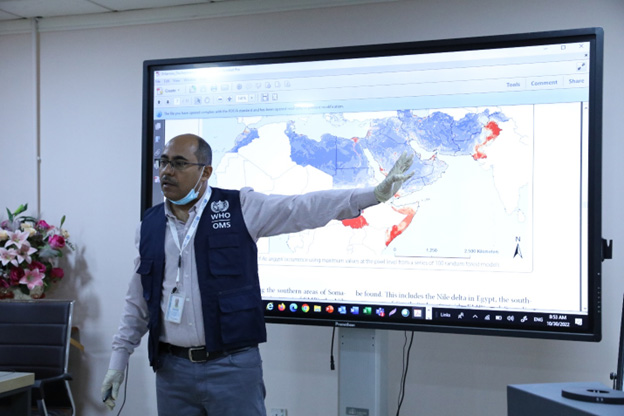15 October 2023, Cairo, Egypt – The WHO Eastern Mediterranean Region has made great strides in strengthening public health intelligence capabilities in recent years, thanks to joint efforts by WHO and the Region’s countries and territories.
WHO stresses the importance of continuous monitoring and prompt signal detection. Hence, a dedicated team of experts in the Regional Office for the Eastern Mediterranean works tirelessly 24/7 to gather public health intelligence from formal and informal sources. These sources include ministry of health websites, International Health Regulations national focal points, and online screening and social media platforms. This comprehensive approach aims to ensure that no potential public health event goes unnoticed.
 A surveillance workshop run by WHO in Iraq. Photo credit: WHO/Health Emergencies Programme
A surveillance workshop run by WHO in Iraq. Photo credit: WHO/Health Emergencies Programme
The results of these efforts have been significant. Between 2018 and 2022, a total of 166 new outbreaks, including the COVID-19 pandemic, were detected and responded to in the Region. Around 30 000 signals were also detected, with nearly 700 requiring further verification. Of these, 234 were categorized as public health events and logged in the WHO Event Management System, with 77 public health risk assessments carried out in relation to these events.
Through concerted efforts, the Epidemic Intelligence from Open Sources (EIOS) initiative is up and running in 12 countries and territories of the Region. This WHO-led initiative aims to strengthen public health intelligence by creating a unified all-hazards, One Health approach to the early detection, verification, assessment and communication of public health threats. Seven more countries have set up and enhanced their event-based surveillance systems with WHO support. This system enables the detection of unusual public health events, illnesses or deaths that may signal an outbreak as early as possible.
“These results underscore the significance of continuous capacity-building from WHO and the adoption of cutting-edge tools and technologies. Through trainings on event-based surveillance and technical assistance in expanding the EIOS initiative, health professionals have been empowered to detect and respond to emerging health threats efficiently,” said Dr Thomas Mollet, Programme Area Manager in the Regional Office’s Health Emergency Information and Risk Assessment Unit.
Innovation and investments
In collaboration with key partners, the Regional Office has also embraced innovative tools, such as epitweetr and Citibeats, which leverage social media and other online platforms for real-time event-based surveillance. This proactive approach enables rapid identification of potential public health events, allowing for timely and effective response strategies.
Critically, WHO has also invested heavily in building regional laboratory capacities, especially during the COVID-19 pandemic. For effective investigation and response, early warning must be accompanied by reliable laboratory diagnosis. This investment has expanded testing capacities to cover a broader range of pathogens, ensuring reliable laboratory diagnosis for diseases such as dengue, Crimean-Congo haemorrhagic fever, cholera and monkeypox. With WHO support, the reference laboratory of every country and territory of the Region, plus more than 300 other laboratories, had passed external quality control reviews by 2022.
A regional strategy for integrated disease surveillance is being implemented to improve surveillance of communicable diseases at the country and regional levels. This strategy, adopted during the 68th session of the WHO Regional Committee for the Eastern Mediterranean, facilitates the timely collection, analysis and sharing of disease-related data across emergencies and disease programmes. By integrating information from multiple sources, the strategy enables identification of patterns, detection of outbreaks, and swift response to mitigate the spread of disease.
By leveraging these resources, countries and territories of the Region can promptly identify potential public health events and take proactive measures to prevent their escalation.
“WHO’s unwavering dedication to strengthening public health intelligence in the Eastern Mediterranean Region has produced remarkable outcomes,” remarked Dr Richard Brennan, Regional Emergency Director. “From round-the-clock efforts for signal detection to substantial investments in laboratory capacities, these WHO-supported initiatives have greatly bolstered the Region’s capacity to promptly detect and respond to potential public health events. With these advances, countries and territories of the Region are building stronger capacities to safeguard the health and well-being of their populations in the face of emerging health challenges.”


